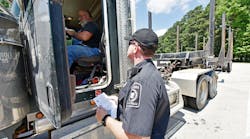The deadline for the electronic logging device (ELD) mandate has come and past. Fleets across the country are getting used to the new ELD reality, and adhering to the mandate has been the big topic of discussion. But lingering ELD technical and enforcement questions remain, and today fleet managers and drivers are encountering issues they never would have thought about until the mandate actually kicked in.
This article aims to answer the ELD mandate questions not often thought about and to clarify previous guidance set forth by the regulators.
I equipped my fleet but just learned my ELD solution isn’t in compliance – what do I do?
As fleets rushed to meet the Dec. 18 deadline to become compliant, some were forced into working with “pop up” ELD solution providers. These “pop up” providers promised cheap and quick ELD solutions, but many simply didn’t provide product that met the ELD requirements as outlined by the Federal Motor Carrier Safety Administration (FMCSA). This has potentially led to confusion among fleet owners and left many wondering if their fleets are in fact in compliance.
Once a fleet owner learns their fleet’s ELD solution is not in compliance, he or she has eight days to reequip the fleet. If the fleet is not reequipped in that time frame, it can incur a penalty from FMCSA. Self-certified ELD solution providers are listed on the FMCSA website, and fleet managers should contact FMCSA immediately if they have concerns about if their ELD solution is not on the list and/or does not meet the requirements.
I heard law enforcement won’t enforce ELD compliance until April – will I face penalties if I wait that long to comply?
According to FMCSA, enforcement personnel will begin documenting violations on roadside inspection reports, and at the jurisdiction’s discretion, issue citations to drivers operating vehicles without a compliant ELD as soon as the mandate goes into effect on December 18th. However, in accordance with the Commercial Vehicle Safety Alliance (CVSA) guidance, inspectors won’t start placing commercial motor vehicle drivers out of service if their vehicle is not equipped with the required device until April 1 2018, but may still issue citations for hour of service violations.
How will enforcement personnel know if my fleet isn’t ELD compliant? How are they enforcing the mandate?
Trained enforcement personnel nationwide are currently examining fleets based on inspection procedures and criteria created by the CVSA. According to the CVSA, around 4 million commercial motor vehicle inspections are conducted every year to ensure fleets are operating in accordance with government and safety regulations. Because CVSA has said the out of service enforcement date for ELD compliance is April 1, 2018, fleet managers will have a grace period to get vehicles equipped before they are removed from service, but they are still subject to citations if they are found to be operating without a certified ELD solution before that date.
I’m worried about the finicky nature of technology – what if my vehicle is equipped with an ELD solution but the tech fails while I’m driving?
This is a tricky situation but not one without an answer. If a vehicle is being inspected but the ELD solution failed that day, the driver will need to create paper logs documenting the record of duty hours of service. Note that the driver’s fleet should have access to the ELD information (providing their system didn’t fail as well) and can forward the logs to the driver to show the inspector. A violation will be issued to the driver if he or she cannot provide logs in any capacity. If the ELD solution is broken, operators have eight days to repair or replace it before facing penalties.
These are a few questions and answers to clarify how the ELD mandate is working and being enforced, but there will certainly be more as the regulation takes full effect.



